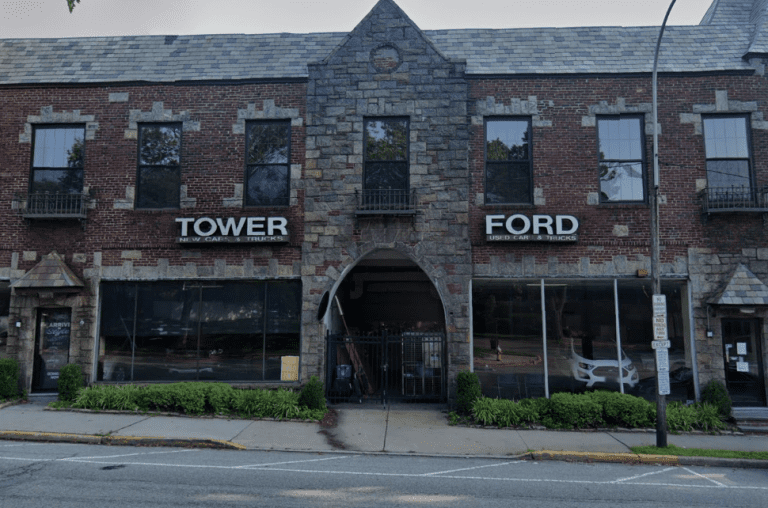A public hearing on a contentious five-story apartment proposal in the Village of Thomaston was canceled after the application was withdrawn, village officials announced Tuesday.
The hearing, which was scheduled for Nov. 15 at the Great Neck South Middle School auditorium, would have been the first time residents had their opinions on the proposal heard in an official public forum. The village, in a statement to residents on Tuesday, announced that the applicant chose not to send out the required legal notice for the hearing and did not pay the $25,000 deposit to the village for an engineering consulting firm.
Officials said 124 Middle Neck Realty LLC, which put forth the application for a five-story apartment complex, intends to modify its proposal.
“The applicant has stated an intention to work with the Village and our Village residents in an amicable manner and to develop modifications to address the concerns of our community for a future application which is financially feasible for a multi-family dwelling on the property,” according to the statement.
Village resident Wendy Halpern, who has led protests against the proposal, said the fight to preserve the Tower Ford site is not over just because the application was withdrawn.
“While we are glad that the developer has now finally realized the tremendous opposition to this project and withdrew the application, had there been proper and sufficient notice months earlier regarding the new incentive law that the mayor sponsored, as well as a meaningful hearing on that law and the project, the public, village, and developer could have avoided much time, energy and expense,” Halpern said in a statement. “We are now waiting for the Village to come to that same realization and immediately repeal the incentive zoning law that was enacted specifically for this project.”
On Nov. 1, the village received a letter from attorney Stephen G. Limmer, the applicant’s legal representation, asking the village not to schedule a hearing on Nov. 15 because revisions to the application were still being reviewed.
Limmer also cited the potential for the property, the former site of Tower Ford, to be listed as a landmark by the state. The state’s Department of Parks, Recreation and Historic Preservation declared the site eligible to be considered as a historic place on Oct. 29. Efforts to reach Limmer or the applicant for comment were unavailing.
Village officials said its Landmark Preservation Committee will review the requests to deem the property a landmark “in due time,” according to the release. Officials said property owners within 250 feet of the site will receive mailed notifications of any committee meetings, along with notifications being posted on the village website and through its Swift911 email service.
The village, in the statement, also said clarification on previously approved modifications to the zoning laws will soon be published online. During a July 12 meeting, village trustees unanimously approved a new local zoning law “for property located in certain adjoining zoning districts,” according to village minutes.
“There still remain many concerning details and unanswered questions regarding the conduct of the Mayor in connection with the enactment of the incentive zoning law.” Halpern said.
The minutes showed that one member of the public was present during the public hearing on the law, which the trustees then adopted.
The law allows the Board of Trustees to have “sole and unfettered discretion” on what conditions and incentive use permit may be granted to certain applicants. The new law applies to applicants that have a property located partially in the Apartment B and Residence 10 zoning districts, a total area of at least 0.75 acres but not exceeding one acre, a depth at its greatest point of at least 200 feet and street frontage on Middle Neck Road of at least 230 feet.
The property at 124 S. Middle Neck Road lies partly in the Apartment B and Residence 10 zoning districts, has a total area of 0.96 acres, and has a depth of 234 feet, according to village documents.
According to the application, the project would provide an incentive payment of $75,000 to the village, a public seating area along Brompton Road and 12 additional parking spaces for the residents of 37 Brompton Road, a smaller apartment building.
Residents said the funds, park benches and additional parking were not a sufficient incentive, claiming they were part of alleged payoffs Weinberg or the village received from the developer.
Last month, a group of residents identified as “The Galleria at Great Neck Condominium” filed a lawsuit against the village, the Board of Trustees and 124 Middle Neck Realty LLC. The legal documents claim that negotiations on the project were conducted between the village and the project’s developer under inappropriate pretenses and the village did not properly evaluate the project’s environmental impact on the rest of the community.
Evidence provided by the petitioners who filed the complaint included emails between Limmer, the applicant, and Thomaston Mayor Steven Weinberg, dating back to last year.
Limmer, in emails to Weinberg, asked what details would be sufficient for an initial presentation of the project, according to the court documents. The complaint calls for the village’s negative declaration for the environmental impact study to be declared null and void.
Weinberg previously declined to comment on pending litigation in an interview with Blank Slate Media but expressed a desire to have public input on the project be on the record at the now-canceled hearing. The litigation against the village remains pending.
Efforts to reach Weinberg for comment were unavailing.
Thomaston residents have questioned why the village approved the modifications to the zoning law with only one member of the public in attendance. Last month Weinberg said it is “unfortunate” that some residents think he received payoffs or was involved in crooked dealings with the applicant, but emphasized how much he and other village officials value their input in regard to the proposal itself.



